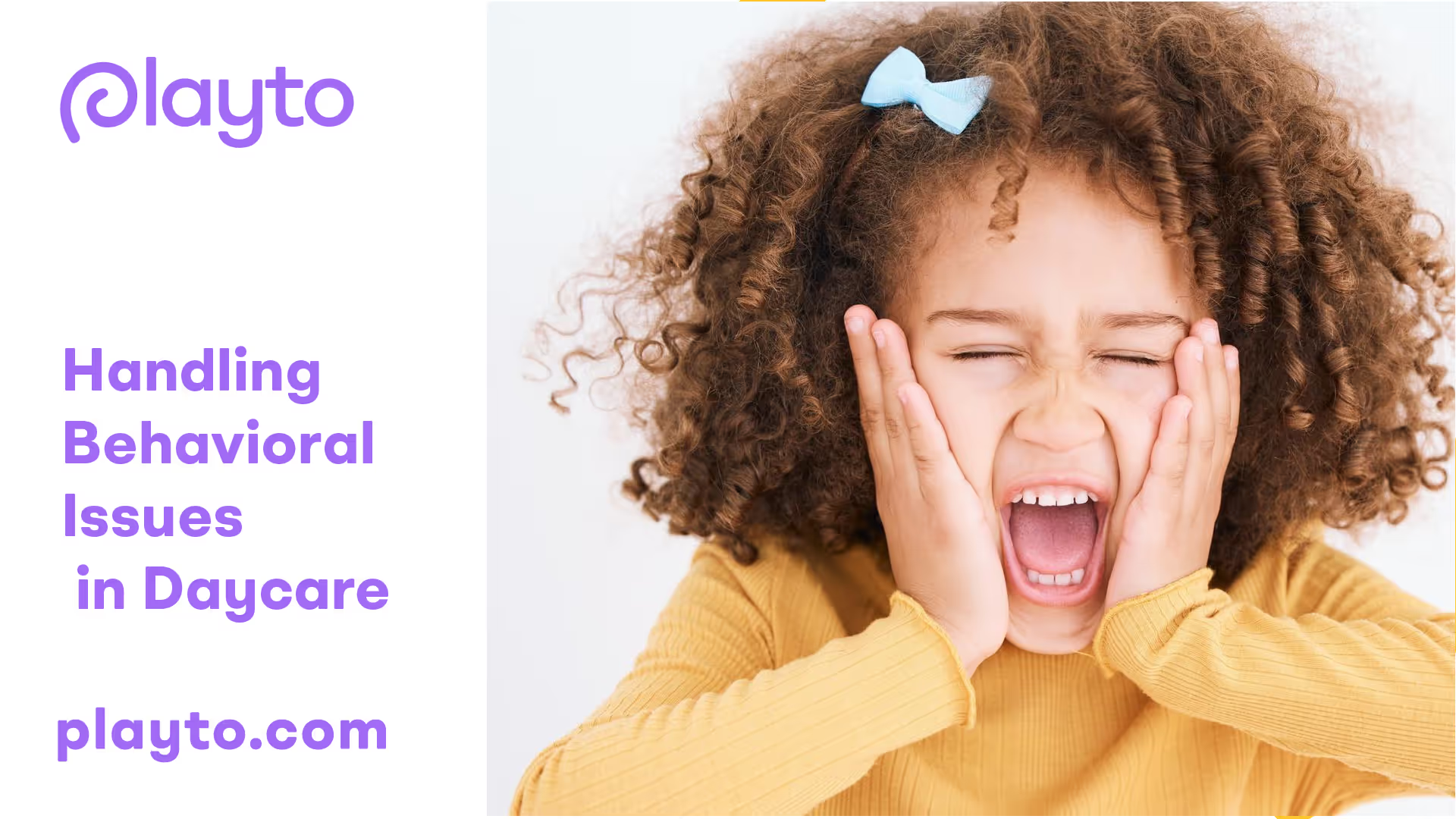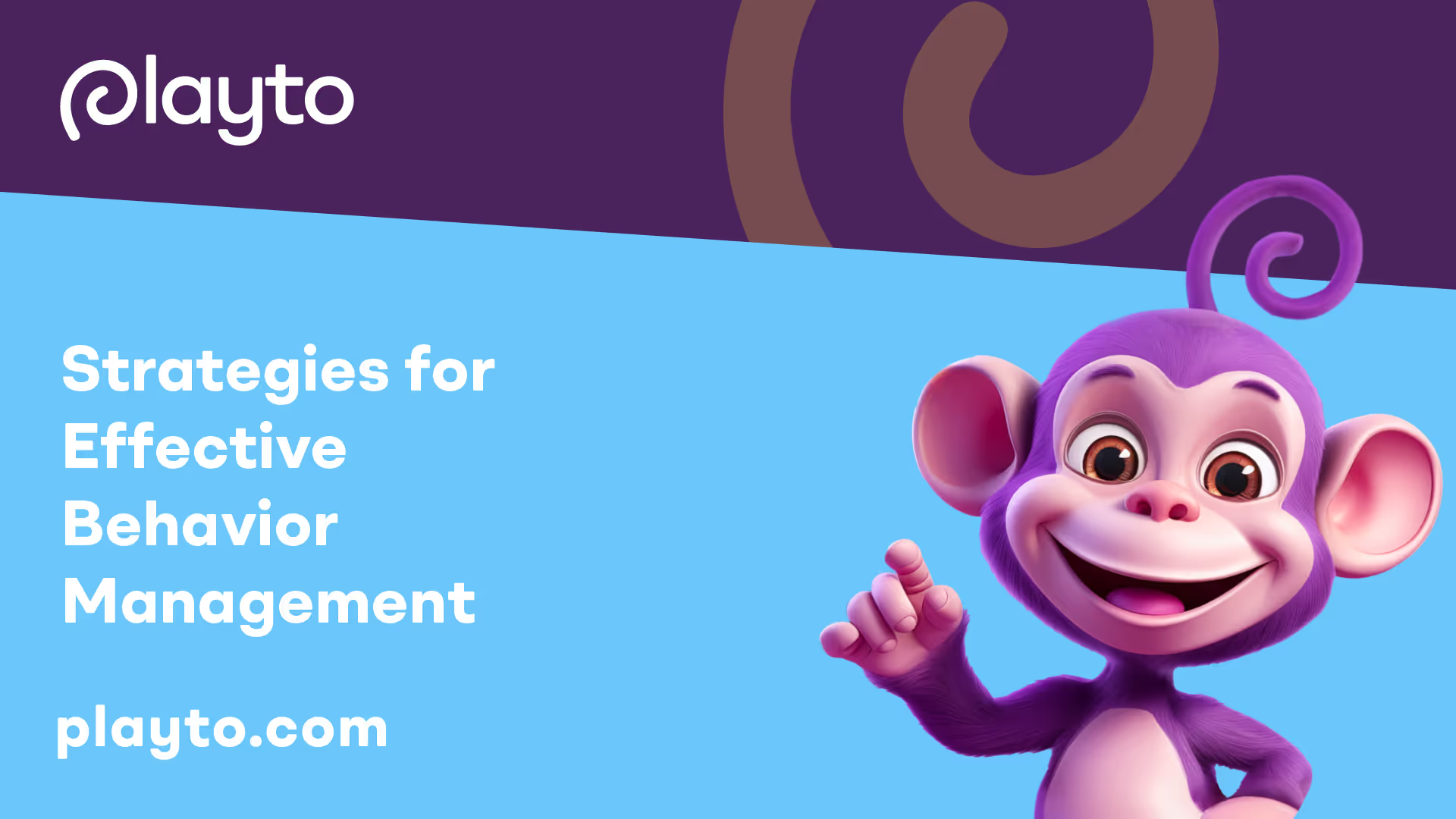Managing Behavioral Issues in Daycare
When it comes to managing behavioral issues in daycare settings, it is crucial to have a deep understanding of child behavior and the importance of behavior management. By doing so, childcare providers can create a positive and nurturing environment that promotes healthy development and learning.

Understanding Child Behavior
Child behavior can vary widely based on factors such as age, temperament, and individual experiences. It is important for childcare providers to recognize that challenging behaviors in children are often a form of communication, as young children may not have the words or communication skills to clearly express their needs or feelings. By understanding and interpreting these behaviors, caregivers can better meet the child's needs and teach them more appropriate ways to express themselves.
A study conducted by the University of Minnesota found that spending more hours in center-based child care is not linked to the development of behavioral problems in young children. The study analyzed data from 10,105 toddlers and preschoolers in the U.S. and internationally, and the findings suggest that there is little support for a connection between child care hours and behavior problems across various samples of children [2]. This suggests that behavioral issues are not solely dependent on the amount of time spent in daycare but are influenced by various other factors.
Importance of Behavior Management
Behavior management plays a crucial role in creating an effective learning environment in daycare settings. It helps reduce disruptions, promotes positive behavior, and supports children in developing important social and emotional skills. Effective behavior management strategies also contribute to preparing children for success in kindergarten and throughout their lives.
Managing behavioral issues in daycare is not only beneficial for the children but also for the safety and reputation of the childcare business. By addressing behavioral issues promptly and consistently, childcare providers can maintain a positive and productive atmosphere for all children.
Childcare providers can be a valuable source of support in handling challenging behaviors in children. Establishing a strong relationship with the provider can facilitate discussions about challenging behaviors and the development of constructive strategies to address them. Collaboration between parents and childcare providers is essential for effective behavior management and ensuring consistency in addressing behavioral issues.
By understanding child behavior and recognizing the importance of behavior management, childcare providers can create a supportive and nurturing environment that promotes positive behaviors and optimal development. In the next sections, we will explore strategies for effective behavior management, techniques for encouraging positive behavior, dealing with challenging behaviors, and implementing effective consequences.
Strategies for Effective Behavior Management

To effectively manage behavioral issues in daycare, it is important to implement strategies that promote positive behavior and create a structured environment. By setting clear expectations, creating structured environments, and considering environmental factors, daycare providers can effectively manage and address behavioral challenges.
Setting Clear Expectations
Setting clear expectations for behavior is crucial in daycare management. Specific, observable, and measurable expectations help create a safe and orderly environment for children, prevent negative behaviors, and build positive relationships between children and staff. When expectations are clearly communicated to children, they have a better understanding of what is expected from them and are more likely to exhibit positive behavior.
Daycare providers should establish age-appropriate rules and guidelines that align with the developmental needs of the children. These rules should be communicated in a positive and consistent manner. By involving children in the rule-setting process, they feel a sense of ownership and responsibility, which can contribute to their adherence to the rules [4].
Creating Structured Environments
Creating a structured environment with routines and schedules is essential for managing childhood behavior in preschools and daycares. Consistent routines provide children with a sense of security and predictability, reducing anxiety and promoting positive behavior. A structured environment helps children understand expectations and transitions, allowing them to feel more comfortable and engaged throughout the day.
Daycare providers can establish a daily schedule that includes consistent meal times, nap times, play times, and learning activities. Visual cues, such as visual schedules and timers, can help children understand and anticipate transitions. Providing a structured environment helps children develop self-regulation skills and promotes a sense of order and routine.
Considering Environmental Factors
When managing behavioral issues in daycare, it is important to consider situational and environmental factors. Children's behavior can be influenced by various factors such as noise levels, temperature, lighting, and the arrangement of the physical space. By creating an environment that is conducive to positive behavior, daycare providers can help minimize challenging behaviors.
Daycare providers should create an environment that is safe, comfortable, and stimulating for children. Providing age-appropriate toys, materials, and activities can engage children and reduce boredom or frustration that may lead to negative behaviors. Additionally, considering the sensory needs of children, such as offering sensory play opportunities, can help regulate their emotions and behaviors.
By setting clear expectations, creating structured environments, and considering environmental factors, daycare providers can effectively manage behavioral issues. These strategies contribute to a positive and nurturing daycare environment, allowing children to thrive and develop important social and emotional skills. For more tips on daycare management, check out our articles on daycare snack ideas for picky eaters, developing social skills in daycare, and the importance of routine in daycare.
Encouraging Positive Behavior
When it comes to managing behavioral issues in daycare, one effective approach is to focus on encouraging positive behavior. By providing praise, positive attention, and establishing a reward system, daycare providers can create a supportive environment that promotes good behavior and social skills development.
Praise and Positive Attention
Encouraging good behavior through praise and positive attention is a powerful strategy for daycare teachers. Specific praise helps children understand what behavior is praiseworthy, and sincere praise is essential for its effectiveness. By acknowledging and highlighting positive actions, such as sharing, listening, or helping others, children feel valued and motivated to continue exhibiting those behaviors.
Incorporating positive attention into daily interactions is equally important. Giving children individual attention, engaging in conversations, and actively listening to their thoughts and feelings can foster a sense of belonging and encourage positive behavior. It is essential to be consistent in providing praise and positive attention to reinforce the desired behaviors.
Rewarding Good Behavior
Rewarding good behavior is another effective strategy for encouraging positive behavior in daycare settings. By offering rewards, such as stickers, small toys, or extra playtime, children are motivated to continue engaging in positive actions. Rewards can be given immediately after the desired behavior is observed to reinforce the connection between the behavior and the reward.
To effectively implement a reward system, it's important to establish clear guidelines and expectations. Communicate to the children what behaviors will be rewarded and how they can earn the rewards. This transparency helps in creating a structured and consistent environment where children understand what is expected of them.
Establishing a Reward System
Creating a reward system that aligns with the daycare's values and goals can significantly contribute to positive behavior management. The reward system can be designed as a menu, where children can select their preferred rewards based on their accumulated points or stickers. This allows children to have a sense of agency and motivation to work towards the desired behaviors.
It's crucial to ensure that the rewards are age-appropriate and meaningful to the children. The reward system should also be flexible enough to accommodate different preferences and interests. Regularly review and update the rewards to keep the system engaging and exciting for the children.
By implementing a reward system and providing praise and positive attention, daycare providers can create an environment that promotes positive behavior and social skills development. These strategies help children feel valued, motivated, and encouraged to exhibit good behavior. In combination with other effective behavior management strategies, such as setting clear expectations and creating structured environments, daycare providers can effectively handle behavioral issues and cultivate a positive and nurturing atmosphere for all children.
For more tips on daycare management, check out our articles on daycare snack ideas for picky eaters, developing social skills in daycare, sensory play in daycare settings, and the importance of routine in daycare.
Dealing with Challenging Behaviors

When working in a daycare setting, it's important for caregivers to have effective strategies for dealing with challenging behaviors. This section will explore three strategies that can be employed: rational detachment, observing and documenting behavior, and discouraging misbehavior with active ignoring.
Rational Detachment
One strategy for managing challenging behaviors in a daycare setting is practicing rational detachment. This involves remaining calm and objective when dealing with difficult behavior. By staying composed, daycare teachers can prevent children from mirroring negative emotions exhibited by the teacher [3]. Rational detachment allows caregivers to maintain control of the situation and respond in a thoughtful manner.
When faced with challenging behavior, it's important to remember that emotions should not dictate the response. Taking a step back and approaching the situation with rational detachment can help caregivers make decisions based on the child's best interests and the overall goals of behavior management.
Observing and Documenting Behavior
Observing and documenting behavior is a key strategy in understanding the causes and patterns of challenging behavior in early childhood education settings. By carefully observing and documenting the behavior, caregivers can gather crucial information that helps to identify triggers, patterns, and potential underlying factors contributing to the challenging behavior.
Keeping a behavior log or using a behavior tracking system can assist in noting the frequency, duration, and intensity of challenging behaviors. This documentation can be shared with parents and other professionals involved in the child's care, fostering collaboration in addressing and managing the behavior effectively.
Discouraging Misbehavior with Active Ignoring
Discouraging mild misbehavior through active ignoring is another strategy that can be effective in a daycare setting. Active ignoring, also known as selective ignoring, involves intentionally not giving attention to mild misbehavior. This approach aims to make the misbehavior non-reinforcing by minimizing the attention it receives.
When a child engages in mild misbehavior, caregivers can redirect their attention to other children or activities. By focusing on positive behaviors and providing attention and praise for those, caregivers can help extinguish the unwanted behavior over time. However, it's essential to ensure that the misbehavior does not pose a risk to the child or others. In such cases, immediate intervention and redirection are necessary.
By implementing strategies such as rational detachment, observing and documenting behavior, and discouraging misbehavior with active ignoring, daycare providers can effectively address challenging behaviors in a supportive and constructive manner. It's important to remember that each child is unique, and a combination of strategies may be needed to best meet their individual needs. Collaborating with parents and seeking professional guidance, when necessary, can further enhance the effectiveness of behavior management in the daycare setting.
Effective Consequences for Behavior
When it comes to handling behavioral issues in daycare, implementing effective consequences is a vital aspect of behavior management. Tailoring consequences to individual children, collaborating with parents, and enforcing consistent consequences are key strategies for promoting positive behavior and discouraging disruptive actions.
Tailored Consequences
Each child is unique, and what works as a consequence for one child may not be effective for another. Tailoring consequences to individual children helps ensure that the consequences are appropriate and meaningful. By understanding the specific needs and behaviors of each child, daycare providers can design consequences that are relevant and have a positive impact on their behavior.
For example, if a child displays aggressive behavior towards their peers, a consequence could involve a temporary removal from group activities or a reflection time to help them understand the impact of their actions. By tailoring consequences to address specific behaviors, daycare providers can guide children towards more positive and appropriate actions.
Collaborating with Parents
Collaboration with parents is essential for effective behavior management in daycare settings. Open and ongoing communication between daycare providers and parents allows for a shared understanding of a child's behavior and the implementation of consistent strategies at home and in the daycare environment. Explaining negative behaviors to parents and discussing the causes and potential solutions can help modify such behaviors over time [4].
By working together, daycare providers and parents can develop a comprehensive approach to behavior management that promotes consistency and reinforces positive behavior across different settings. This collaboration fosters a supportive environment for the child, ensuring that everyone involved in their care is on the same page.
Enforcing Consistent Consequences
Consistency is key when it comes to consequences for behavior in daycare settings. Children thrive in environments with clear and consistent expectations. Daycare providers should establish a set of rules and consequences from the beginning, ensuring that both children and parents are aware of the expectations and the consequences of certain behaviors [4].
Enforcing consistent consequences helps children understand the cause-and-effect relationship between their actions and the resulting consequences. This fosters a sense of accountability and helps shape their behavior over time. By consistently applying consequences, daycare providers create a structured and predictable environment that supports positive behavior and reduces disruptions.
By implementing tailored consequences, collaborating with parents, and enforcing consistent consequences, daycare providers can effectively manage behavioral issues and promote positive behavior in the daycare setting. These strategies not only help create a conducive learning environment but also contribute to the child's overall development and well-being.
Training and Workshops for Daycare Providers
To effectively handle and manage behavioral issues in daycare, continuous professional development through training and workshops is essential. These educational opportunities equip daycare providers with valuable knowledge and strategies to promote positive behavior and address challenging behaviors. Let's explore some key training areas for daycare providers.
Stress Management Techniques
Stress can have a significant impact on both children and daycare providers. The session on "Toxic Stress and Early Brain Development" provides insights into the effects of stress and trauma on children's development, highlighting the importance of caring adults in protecting children from the effects of toxic stress. It emphasizes the role of daycare providers in offering protection, structure, comfort, and coaching to safeguard children from stress.
Additionally, the workshop on "Buffering Stress through Responsive Relationships" focuses on strategies that daycare providers can employ to create nurturing and supportive environments. By fostering protective relationships and teaching emotional and behavioral self-regulation to at-risk children, daycare providers can help buffer the effects of stress.
Problem-Solving Skills for Children
Developing problem-solving skills is crucial for children's social and emotional development. The session on "Problem-Solving with Children, ages 2-5" is designed to equip daycare providers with techniques to teach children how to resolve their own problems. By empowering children with problem-solving skills, daycare providers can not only ease their own workload but also impart valuable lifelong skills to children.
Giving Effective Directions
Clear and effective communication is essential in managing behavior in daycare settings. The training session "Giving Directions: We're not in the Army now" focuses on teaching daycare providers strategies for giving directions effectively. By using techniques that increase compliance and minimize the need for frequent directions, daycare providers can create a more structured and cooperative environment.
By participating in these training sessions and workshops, daycare providers can enhance their knowledge and skills in managing behavioral issues. These educational opportunities provide valuable insights into stress management, problem-solving, and effective communication techniques. By implementing these strategies, daycare providers can create a positive and nurturing environment that supports children's social and emotional development.
